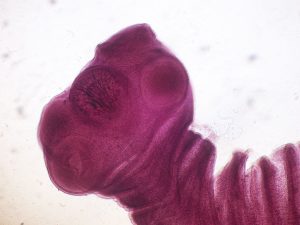 Taenia solium, commonly known as the pork tapeworm, is a parasitic flatworm that infects humans when they consume undercooked or contaminated pork containing the larvae or cysts of the parasite. The infection it causes is called taeniasis, and it can lead to digestive issues such as abdominal pain, nausea, diarrhea, and weight loss. The adult tapeworm lives in the human intestines, attaching itself to the intestinal walls and growing several meters long. Often, the infection is mild or asymptomatic, and patients may not be aware of it unless segments of the tapeworm are passed in their stool.
Taenia solium, commonly known as the pork tapeworm, is a parasitic flatworm that infects humans when they consume undercooked or contaminated pork containing the larvae or cysts of the parasite. The infection it causes is called taeniasis, and it can lead to digestive issues such as abdominal pain, nausea, diarrhea, and weight loss. The adult tapeworm lives in the human intestines, attaching itself to the intestinal walls and growing several meters long. Often, the infection is mild or asymptomatic, and patients may not be aware of it unless segments of the tapeworm are passed in their stool.
The more severe form of infection is cysticercosis, which occurs when the larval form of Taenia solium migrates and forms cysts in various tissues of the body, including muscles, eyes, and the brain. When the larvae invade the brain, a condition called neurocysticercosis can develop, causing seizures, headaches, and other neurological symptoms. Neurocysticercosis is a leading cause of epilepsy in some developing countries. Removing Taenia solium from the body, especially in the case of neurocysticercosis, can significantly improve health outcomes, potentially reducing seizure frequency and improving neurological function. Treatment typically involves antiparasitic medications, but in cases of severe cysticercosis, surgical intervention may be necessary. Prevention revolves around proper pork handling, thorough cooking, and improved sanitation practices to break the parasite’s life cycle.



